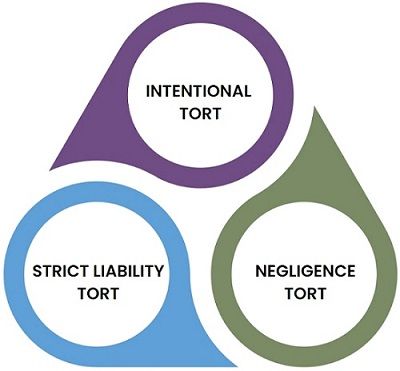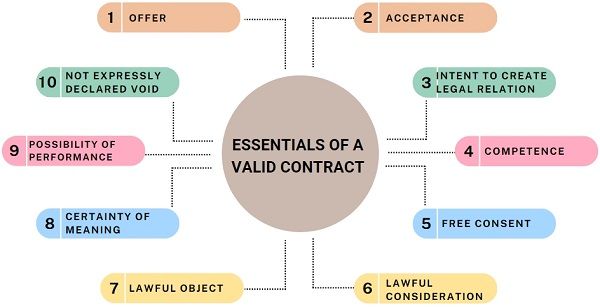 Contract Law encompasses consent-based relationships between parties. In this one party to the contract agrees to perform a certain obligation in exchange for something from the other party. Contracts indicate commitments made by the parties for the future. The parties entering into the contract expect the fulfilment of the commitment in future.
Contract Law encompasses consent-based relationships between parties. In this one party to the contract agrees to perform a certain obligation in exchange for something from the other party. Contracts indicate commitments made by the parties for the future. The parties entering into the contract expect the fulfilment of the commitment in future.
Conversely, Tort Law is concerned with non-consensual relationships, wherein the action or omission of one party causes harm to another.
A tort is a civil wrong which is different from a breach of contract. Hence, the legal rules regarding contractual responsibility of the fault vary from those regulating tort liability. While tort implies a violation of law, a breach of contract is nothing but an infringement of legal rights.
There are a number of differences between Tort and Contract which we are going to discuss here.
Content: Tort Vs Contract
Comparison Chart
| Basis for Comparison | Tort | Contract |
|---|---|---|
| Meaning | A tort is an unjustified act or omission which results in harm to another person or property. | The contract is an agreement which can be enforced in a court of law. |
| Liability | Parties are liable for the breach of the terms of the agreement. | Depends upon the breach of legal duty towards other persons. |
| Duties | It is the law which determines duties. | It is the parties to the contract which determine duties. |
| Minors | Minors can be sued for recovery of damages. | The liabilities of minors are limited. |
| Rights and Obligations | It results from common law created by the court. It is based on circumstances. | It results from the agreement existing between the parties concerned. |
| Compensation | Backward-looking | Forward-looking |
| Duty | Owed to the community at large. | Owed to the specific persons. |
| Damages | Real, Exemplary, Unliquidated or Contemptuous. | Real and Liquidated |
| Period of Limitation | It is considered from the date when the damage is suffered. | It is considered from the date of breach of contract. |
| Consent | Committed without consent. | Based on the consent of contracting parties. |
| Law | Made by judges | Codified law |
| Lawsuit | The third-party can also file a lawsuit. | Only contracting parties can file a lawsuit, except under certain conditions. |
| Remedy | Claim for unliquidated damages. | Claim for liquidated damages. |
| Privity | No privity exists. | Privity of the contract must be present. |
What is Tort?
Tort Law aims at determining whether one party is accountable for the harm caused to another party. Further, it also ascertains the amount to be paid by the defendant to the affected party as compensation. In tort law, the word harm covers:
- Pain
- Payment of medical expenses
- Loss of future income and suffering
- Property damage
- Unexplainable loss of wages
The point to note here is that the objective of compensating the aggrieved party is to pay for the damages of a person’s inflicted rights, as they were pre-tort.
Furthermore, there are some cases in which along with the compensatory damages, the court rewards Disciplinary damages to the aggrieved party. The main intention behind doing so is not to reimburse, but it aims at penalizing the irresponsible behaviour of the defendant and preventing others from adopting such behaviour.
Classification of Tort
Intentional Tort
As the name suggests, an intentional tort is when someone intentionally does or adopts wrongful conduct, resulting in harm to some other person. In this, the aggrieved party is required to prove that the tort was committed deliberately or purposefully.
Examples: Trespass, Assault, Fraud.
Negligence Tort
One in which a party fails to adopt a reasonable standard of care. To be called a negligence tort, it must qualify the following criteria:
- Duty of care
- Violation of that specific duty
- Causation
- Presence of Damages
The maximum number of torts which are brought to the court is due to negligence.
Examples: Accidents by vehicles, Medical malpractice, etc
Strict Liability Tort
The kind of liability that does not pay attention to the presence of intention or negligence or mental state of the accused.
Example: Owning wild animals, Planting poisonous trees, etc.
Also Read: Difference Between Tort and Crime
What is a Contract?
The contract implies any agreement which can be legally enforceable. So, agreement and legal enforceability of the agreement are the two important elements of a contract.
Meaning of Agreement: Well, when a person makes a proposal to another person and that proposal is accepted within the given time frame, it turns out as a promise. Every promise and its set thereof that forms consideration for the parties concerned, is an agreement.
Meaning of Legal Enforceability: When an agreement is enforceable by law, it means that it creates legal obligations. Hence, the parties to the agreement are obligated to perform their part. If any of the parties fail to do so, the other one has the right to sue.
Contract Law is concerned with the fundamental principles of law related to contracts including special provisions regarding Bailment, Indemnity, Guarantee, Agency and Pledge. It aims at regulating the behaviour of the parties to the contract so that any issues arising between them can be resolved in a proper manner.
Examples
- When you purchase vegetables from the vegetable seller, you enter into a contract with the vegetable seller.
- When you take a taxi to the office, you enter into a contract with the taxi service company.
Essentials of a Valid Contract
Offer
When one party proposes something to another party, the proposal is said to be the offer.
Acceptance
The proposal is said to be accepted when the person to whom the offer is made approves the same. On the acceptance, the proposal becomes a promise.
Intent to create a legal relationship
One must take note that the offer is made with the intent to enter into a legal relationship.
Competence
Contracting parties must be in a capacity to enter into a contract
- They should have attained the age of majority.
- They must be of sound mind. That means he must be able to understand the terms of the contract completely.
- Also, they should not be disqualified by law to enter into a contract.
Free Consent
The parties must give their consent freely and genuinely. So, it should not be affected by coercion, undue influence, fraud and misrepresentation. This means that the parties must accept the proposal without any kind of threat or fear.
Lawful Consideration
It refers to ‘something in return’. The agreement must be backed by consideration by both parties. Basically, it is the price for the promise. It is not necessary that consideration should be in cash only. That is the consideration can be in kind also
Lawful Object
The object of the contract must be lawful, i.e. it should not be immoral, forbidden by law, unlawful, or opposed to public policy. In other words, it should not promote illegality in any way.
Certainty of Meaning
The parties must agree on the same thing in the same sense, i.e. consensus-ad-idem.
Possibility of Performance
An agreement comprises reciprocal promises. These promises must be possible to perform. Hence, an agreement of performing an impossible act is legally unenforceable.
Agreement not expressly declared void
Some agreements are declared void by the law which includes wagering agreement, agreement in restraint of trade, agreement in restraint of marriage, agreement with minors, etc.
Writing and Registration
A contract can be oral or written. however, in special cases, the contract must be written as well as registered.
Also Read: Difference Between Contract and Agreement
Key Differences Between Tort and Contract
- A wrongful act or negligence that causes damage to life or property comes under tort. As against, the contract is the legal agreement between two or more persons, for mutual consideration and a lawful object.
- The parties to the contract are liable for the breach of its terms. As against, in tort, the liability of the parties will rely upon the breach of legal duty towards other persons.
- The rights and obligations in case of tort result from common law created by the court. It is based on circumstances, i.e. it varies from one case to another. Further, it applies even when the parties are strangers. On the contrary, contract law results from the agreement existing between the parties concerned. Moreover, the contract law is subject to privity, i.e. only the parties to the contract can sue and be sued.
- Tort involves a violation of a right in rem, which means the right vested in the public at large. This is available to the world at large. Conversely, in the case of a contract, there is a violation of a right in personam. It implies that the right is available and enforceable against specific persons.
- In tort, the duties and obligations are decided or imposed by law. Further, it is owed to the community as large. Conversely, in a contract, the duties and obligations depend upon the consent of the parties and the terms of the agreement. However, it is owed to the parties concerned.
- In the case of tort, privity does not exist, as harm is inflicted against the consent of the aggrieved party. In contrast, in the case of a contract, privity is present between the parties as they are legally bounded against each other.
- In tort, minors can be sued for recovery of damages, out of their property. As against, in contract law, the minority is a good escape or defence. This is because the contract with minors is void from the very beginning. Hence, no rule of estoppel is applicable.
- In case of tort, real, exemplary, unliquidated or contemptuous damages are awarded to the aggrieved party. In contrast, real and liquidated damages are awarded to the aggrieved party.
- In contrast, the remedy for the breach is confined to the performance of the agreement, recovery of damages or termination of the agreement. Conversely, in tort, the remedy cover compensation for the damage suffered, injunctions for stopping further damage, etc.
Conclusion
Above all, in contract law, the damages are confined to the losses which the parties incur as a direct consequence of the breach of contract. In tort law, the damages cover compensation of different types including damage to property, physical and emotional harm, loss of income, etc.









Leave a Reply